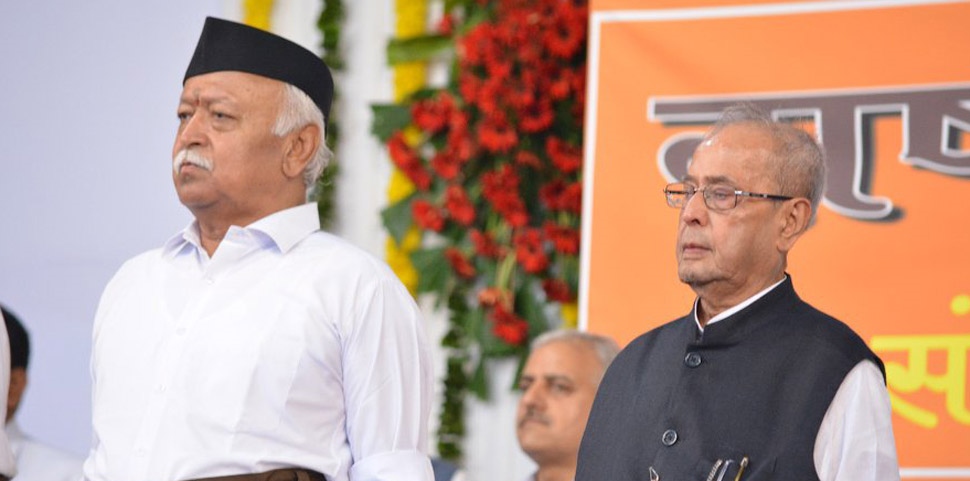Universalism: The Genesis of Indian Nationalism
June 8, 2018 | Expert Insights

“The soul of India resides in pluralism and tolerance. This plurality of our society has come through assimilation of ideas over centuries. Secularism and inclusion are a matter of faith for us. It is our composite culture, which makes us into one nation.”
This was the message shared by Former President Pranab Mukherjee addressed the closing ceremony of the 'Tritiya Varsha Sangh Shiksha Varg', an Rashtriya Swayamsevak Sangh (RSS) event to mark the conclusion of a three-year training camp in Nagpur.
Background
Pranab Mukherjee is a Congress party leader born in West Bengal in 1935. He succeeded Pratibha Patil to serve as the President of India from 2012-2017. A former teacher and editor, he first ran for public office in 1969 and won a seat in the Rajya Sabha (upper house). He has served on the boards of the International Monetary Fund and the World Bank.
The Rashtriya Swayamsevak Sangh, also known as the Rashtriya Seva Sangh (RSS) was founded in 1925 by Keshav Baliram Hedgewar. It is a hindu national volunteer organization that advocates the concept of “Hindutva”, a form of Hindu nationalism.
Analysis
The Former President of India expanded on his understanding of the concepts of Nation, Nationalism, and Patriotism in the context of India, and what the idea of Bharat truly meant.
According to him “Nation is defined as ‘a large group of people sharing the same culture, language or history and inhabiting a particular state or area’. Nationalism is defined as ‘identification with one's own nation and support for its interests especially to the exclusion of interests of other nations’ and Patriotism as the ‘devotion to and vigorous support for’ one’s country”.
The former President remarked that India was a state long before the concept of the European Nation State gained ground after the Treaty of Westphalia in 1648. According to him, this model - of a defined territory, a single language, shared religion and a common enemy - is the model, which led to the formation of various nation states in Europe. He remarked “Indian Nationalism emanated from ’Universalism’ the philosophy of Vasudhaiva Kutumbakam and Sarve Bhavantu Sukhinah, Sarve Santu Niramayah. We derive our strength from tolerance. We accept and respect our pluralism. We celebrate our diversity. These have been a part of our collective consciousness for centuries.”
He believed Nation and Nationalism were not bound by geography, language, religion, or race. He quoted Gandhiji to say that Indian nationalism was not exclusive, nor aggressive, nor destructive. He referred to the Nationalism that Pandit Jawaharlal Nehru expressed in the 'Discovery of India', “I am convinced that Nationalism can only come out of the ideological fusion of Hindu, Muslim, Sikh, and other groups in India. That does not mean that extinction of any real culture of any group, but it does mean a common national outlook, to which other matters are subordinated.”
The former President reiterated that Democracy is not a gift, but a sacred trust. He remarked that The Indian Constitution is not merely a legal document but a Magna Carta of socio-economic transformation of the country. According to him, the construct of Indian nationalism is 'Constitutional Patriotism', which consists of an appreciation of our inherited and shared diversity; a readiness to enact one's citizenship at different levels; the ability to self correct and learn from others.
He emphasized that India's Nationhood is not one language, one religion, or of one enemy. It is the 'Perennial Universalism' of 1.3 billion people who use more than 122 languages and 1,600 dialects in their everyday lives, practice 7 major religions, belong to 3 major ethnic groups - Aryans, Mongoloids, and Dravidians live under one system, one flag and one identity of being 'Bhartiya' and have 'No Enemies'. “That is what makes Bharat a diverse and united nation”.
According to him, a dialogue is necessary not only to balance the competing interests but also to reconcile them. “We may argue, we may agree, or we may not agree. But we cannot deny the essential prevalence of multiplicity of opinion”.
The former President stressed the importance of peaceful co-existence, compassion, respect for life, and harmony with nature as the core of the Indian civilization.
Assessment
Our assessment is that the speech by the former President was profound in many ways. We believe that his decision to speak at the RSS event to an audience that may have divergent views on Nation, Nationalism, and Patriotism demonstrated his commitment to engage in a dialogue on issues of national importance. We feel that his inference to Kautilya’s shloka from Arthashastra that the happiness of the king lies in the happiness of the people, sums it all. People are at the centre of all activities of the state and nothing should be done to divide people and create animosity amongst them.








Comments